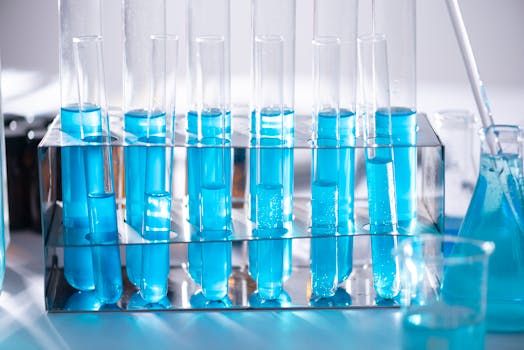The Role of Biotechnology in Modern Medicine
Biotechnology has become a cornerstone in modern medicine, transforming the way we understand, diagnose, and treat various health conditions. This scientific field encompasses the use of living organisms, cells, and biological systems to develop products and technologies that improve human health. From genetic engineering to the production of biopharmaceuticals, biotechnology offers groundbreaking solutions that are revolutionizing healthcare.

Genetic Engineering: Tailoring Treatments to Individual Needs
Genetic engineering is one of the most prominent applications of biotechnology in medicine. By manipulating DNA sequences, scientists can correct genetic disorders, enhance the effectiveness of treatments, and even prevent diseases before they manifest. Techniques such as CRISPR-Cas9 allow for precise edits to the genome, providing hope for conditions like cystic fibrosis, sickle cell anemia, and certain types of cancer.
Moreover, genetic engineering enables personalized medicine. By understanding an individual's genetic makeup, doctors can tailor treatments that are more effective and have fewer side effects. This personalized approach not only improves patient outcomes but also reduces healthcare costs by minimizing trial-and-error prescribing.
An example of this is the development of CAR-T cell therapy for cancer treatment. This innovative therapy involves modifying a patient's T-cells to recognize and attack cancer cells more effectively. According to cancer.gov, CAR-T cell therapies have shown promising results in treating certain types of leukemia and lymphoma.
Biopharmaceuticals: Advanced Therapeutics for Complex Diseases
Biopharmaceuticals are another significant contribution of biotechnology to modern medicine. These drugs are produced using living organisms or their cellular components and include a wide range of products such as monoclonal antibodies, vaccines, and recombinant proteins. Biopharmaceuticals offer targeted treatment options for complex diseases that traditional small-molecule drugs often cannot address.
Monoclonal antibodies, for instance, are engineered proteins that bind specifically to target molecules involved in disease processes. They have been instrumental in treating conditions like rheumatoid arthritis, multiple sclerosis, and various cancers. The specificity of these antibodies reduces the risk of side effects compared to conventional therapies.
One notable example is Herceptin (trastuzumab), a monoclonal antibody used to treat HER2-positive breast cancer. According to fda.gov, Herceptin has significantly improved survival rates for patients with this aggressive form of cancer.
Regenerative Medicine: Repairing and Replacing Damaged Tissues
Regenerative medicine is a branch of biotechnology focused on repairing or replacing damaged tissues and organs. This field leverages stem cells, tissue engineering, and biomaterials to restore normal function in patients with debilitating conditions. Stem cell therapy, for example, involves using undifferentiated cells that can develop into specialized cell types needed for tissue repair.
Tissue engineering combines cells with scaffold materials to create functional tissues that can be implanted into patients. This approach has shown promise in treating conditions like spinal cord injuries, heart disease, and severe burns. Biomaterials play a crucial role in regenerative medicine by providing the structural support needed for tissue growth and integration.
A well-known success story in regenerative medicine is the use of bioengineered skin grafts for burn victims. These grafts are created using a patient's own cells to minimize the risk of rejection and promote faster healing. The Mayo Clinic has reported significant advancements in this area, improving outcomes for patients with extensive burn injuries (mayoclinic.org).
Diagnostic Technologies: Enhancing Early Detection
Advances in biotechnology have also led to the development of cutting-edge diagnostic tools that enhance early detection and monitoring of diseases. Techniques such as polymerase chain reaction (PCR), next-generation sequencing (NGS), and liquid biopsies allow for rapid and accurate identification of pathogens, genetic mutations, and biomarkers associated with various health conditions.
PCR technology has become a staple in diagnostic laboratories due to its ability to amplify small amounts of DNA or RNA for analysis. This method is widely used in infectious disease testing, including COVID-19 diagnostics. NGS offers comprehensive genomic analysis, enabling the identification of genetic predispositions to diseases like cancer and cardiovascular disorders.
Liquid biopsies represent a non-invasive approach to detecting cancer-related mutations from blood samples. This technology allows for real-time monitoring of tumor evolution and treatment response without the need for invasive procedures. According to nature.com, liquid biopsies hold great potential for improving cancer management through early detection and personalized treatment strategies.
The Future of Biotechnology in Medicine
The future of biotechnology in medicine looks promising as research continues to uncover new applications and refine existing technologies. Emerging fields such as synthetic biology aim to design and construct new biological parts and systems that can be used in medical applications. Additionally, advances in computational biology are enhancing our ability to model complex biological processes and predict treatment outcomes.
- Synthetic biology: Designing new biological systems
- Computational biology: Modeling biological processes
- Nanobiotechnology: Developing nanoscale medical devices
Nanobiotechnology is another exciting area with potential applications ranging from targeted drug delivery to diagnostic imaging. By manipulating materials at the nanoscale level, scientists can create highly specific therapies that minimize side effects while maximizing therapeutic efficacy.
| Biotechnology Application | Key Benefits |
|---|---|
| Genetic Engineering | Personalized treatments; correction of genetic disorders |
| Biopharmaceuticals | Targeted therapies; reduced side effects |
| Regenerative Medicine | Tissue repair; organ replacement |
| Diagnostic Technologies | Early detection; real-time monitoring |
| Synthetic Biology & Nanobiotechnology | Innovative treatments; enhanced precision |
The role of biotechnology in modern medicine is multifaceted and transformative. From genetic engineering offering personalized treatments to biopharmaceuticals providing advanced therapeutics for complex diseases, biotechnology continues to push the boundaries of what is possible in healthcare. Regenerative medicine holds promise for repairing damaged tissues, while cutting-edge diagnostic technologies enhance early detection capabilities.
Emerging fields like synthetic biology and nanobiotechnology pave the way for even more innovative solutions. As research progresses and new discoveries are made, the impact of biotechnology on modern medicine will undoubtedly continue to grow, offering hope and improved outcomes for patients worldwide.